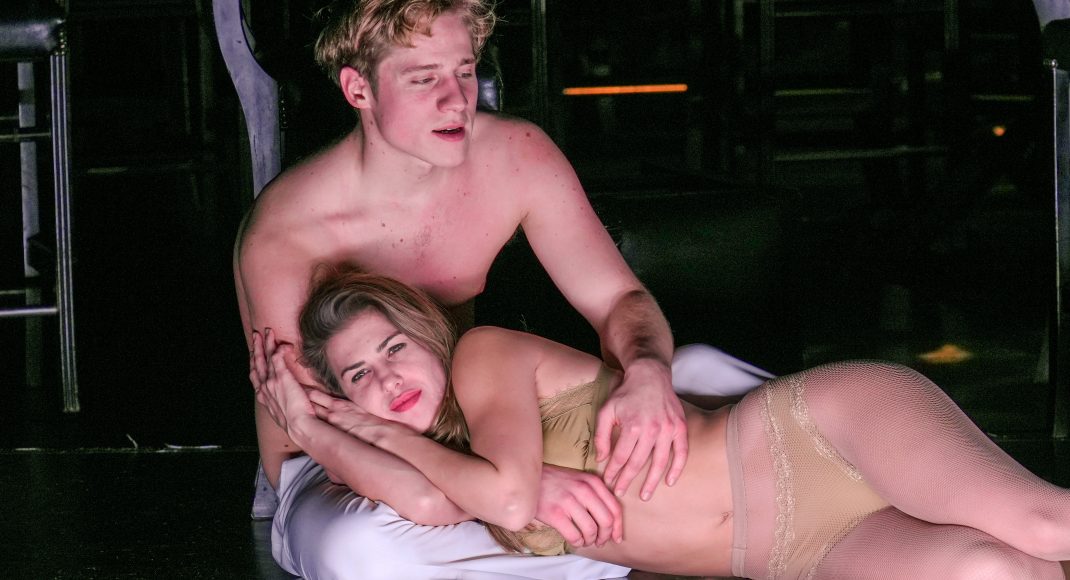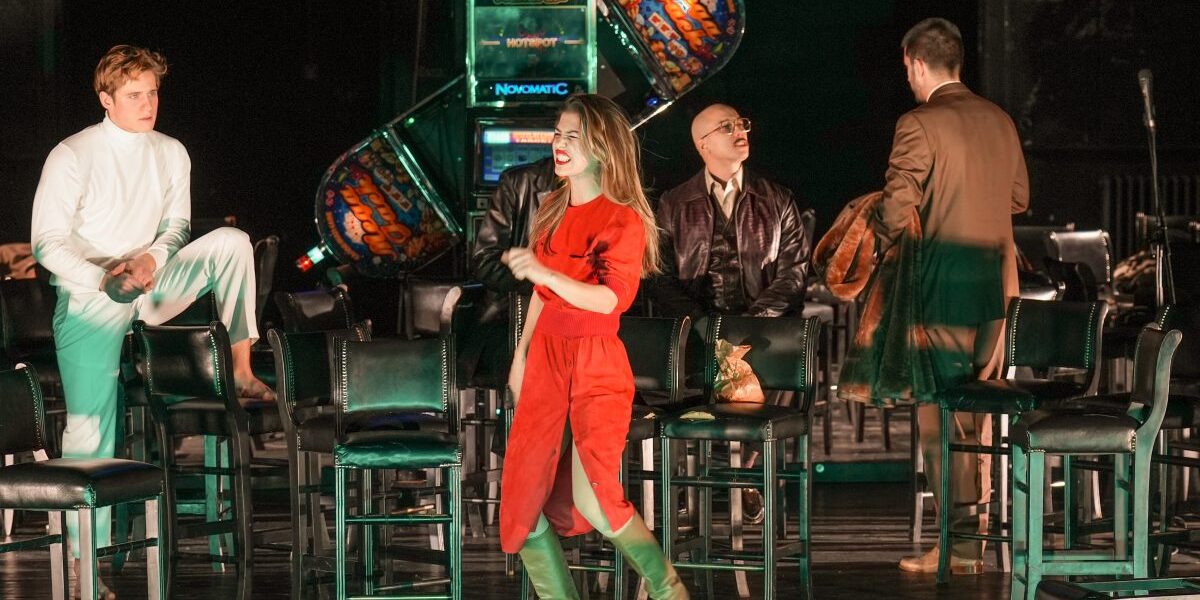Belgrade Drama Theatre, premiere 20th February 2023
Prince Mishkin, the title character of Dostoevsky’s The Idiot, is an extreme aesthetic construction. He is a radical existential ideal. Dostoevsky wanted to portray a truly beautiful soul, almost a saint, but his hero isn’t in tune with the way society functions and he is declared an idiot by all.
Mishkin is selfless, merciful and compassionate. But his interactions with people cause the darkest of problems that lead him and others to their downfall. The complex, polyphonous narrative of one of Russia’s greatest writers explores the possibility of ideal goodness, tests it in the real-life context of 19th-century Petrograd high society, and explores the idea of true redemption.
Dostoevsky late said that he had written the novel in haste and wasn’t satisfied with its final form. Yet he was proud of the idea itself. The Idiot has come to be regarded as a masterpiece of world literature. It is also 600 pages long. Vladimir Tabašević has the difficult task of adapting and condensing the novel into a dramatic form without completely losing the sense of the original.
Tabašević undertakes this task with director Ivica Buljan, and set designer Aleksandar Denić, a trio of artists who previously collaborated on the production of Tabašević’s first novel Quietly Flows the Mississippi at the same theatre.
Tabašević has some success in this near impossible task: he drastically shortens or removes some of the novel’s subplots – the story of the unfortunate Marie – and philosophical sections, (a treatise on the death penalty). The main character’s epilepsy is reduced to a single seizure, which is used as a means to reach the climax. Tabašević also retains the less necessary comic scenes General Ardalion Alexandrovich Ivolgin. This signals that he is less concerned with making this a serious, intellectual exercise. The scandalous, dramatic, melodramatic and comic qualities of the text come to dominate without the narrators’ explanations and descriptions to add balance. This is also evident in the opening monologue by Mirjana Karanović, in the role of Lizaveta Prokofyevna Yepanchin, who explains that the fate of Anastassya Filippovna Barashkov, the character who drives the plot of the novel, would surely go viral on social media today.
Set designer Aleksandar Denić places the action amid a sea of bar stools through which the characters have to make their way, while above them there stands a huge Orthodox cross made up of glowing slot machines. Social networks, pubs, casinos and lavish costumes (costume designer: Ana Savić Gecan) mark out the various vices addressed in the performance, along with, of course, sexual desire (Nastassya and Rogozhin end up having sex on a cross). Religion has been completely pushed out of modern life and society has stumbled in the face of temptation.
The design speaks to the dominance of material values over spiritual virtues, but director Ivica Buljan fails to effectively coordinate the text, the action on stage and the scenography into a coherent whole, making it seem as if each of these segments could function independently. Undeveloped symbolism makes it difficult not only to understand whether the director is lamenting or criticising orthodoxy, but also to discern what they want to achieve with this three-hour piece, which even denies the audience an intermission by having an actor read a beautifully written but essentially trivial essay on prevailing opportunism and social collapse in the middle of the show.

The Idiot. Photo: Dragana Udovičić
For the umpteenth time, the actors of the Belgrade Drama Theatre ensemble rescue an, at times, confused production with their inspired performances. The talented young performers compensate for an authorial vision that is often unclear. Jana Milosavljević is particularly strong, shining in the pivotal role of Nastassya. Abused and dishonoured, in a whirlpool of confused emotional states, she seeks revenge while blaming and condemning herself. On this self-destructive path, triggered by her unusual beauty and unbridled male lust, she is a provocative presence on stage. Buljan has chosen to accentuate this by having her appear mostly in her underwear – I’m not sure if this is the most subtle solution.
Luka Grbić’s Prince Myshkin is gentle and tender, shy, naïve and chaste, which is also reflected in his white costume. (Though he too sometimes appears shirtless, for reasons that remain unclear). With his appearance, his gentle speech, the way he always sits barefoot on the back of a chair, elevated from the others, he’s the antithesis of the other characters who are always calculating, scheming or suffering.
The infinitely talented actors Aleksandar Jovanović, as the ridiculous General Ivolgin, and Miloš Petrović Trojpec, as the wicked Afanasy Ivanovich Totsky, also stand out in their supporting roles. Guest actor Milan Kolak, gave goosebumps in the role of Hippolite Terentyev with a realistic, nervous portrayal of a man seriously ill with tuberculosis in the short scene in which he describes his views on life and then fails with a suicide attempt. But, despite this, it seems to me that those who haven’t read the novel will not be able to fully comprehend the relationships between the characters, their function (especially that of the minor characters) or the motivation for some of their actions.
Quietly Flows the Mississippi, the product of the original collaboration between the trio, was an entertaining and dynamic production. Faced with Dostoevsky’s ambiguous world, they once again demonstrated their ability to create the impression of a carefully thought-out concept skilfully and stylishly delivered, the intentions of which perhaps remain known only to the authors themselves. This is by no means to be taken as a complaint; on the contrary, when they have at their disposal the artistic resources of one of the best-organised theatres in the country, with an extremely talented and rejuvenated ensemble, an atmosphere of youthful exuberance on the part of the actors emerges, instead of a rational synthesis of all aspects of the stage.
With such ensemble at his side, the director can relax completely into his intuition, reassured that the actors will deliver a performance worth seeing.
Main image: Dragana Udovičić
Credits:
Director: Ivica Buljan//Translation//Jovan Maksimović//Adaptation// Vladimir Tabašević// Scenography: Aleksandar Denić//Costume: Ana Savić Gecan//Composer: Mitja Vrhovnik Smrekar
For tickets and further information, visit: bdp.rs
Further reading: review of Shakespeare in Love at Belgrade Drama Theatre, starring Luka Grbić
Andrej Čanji is a theatre critic and theatrologist based in Belgrade.








